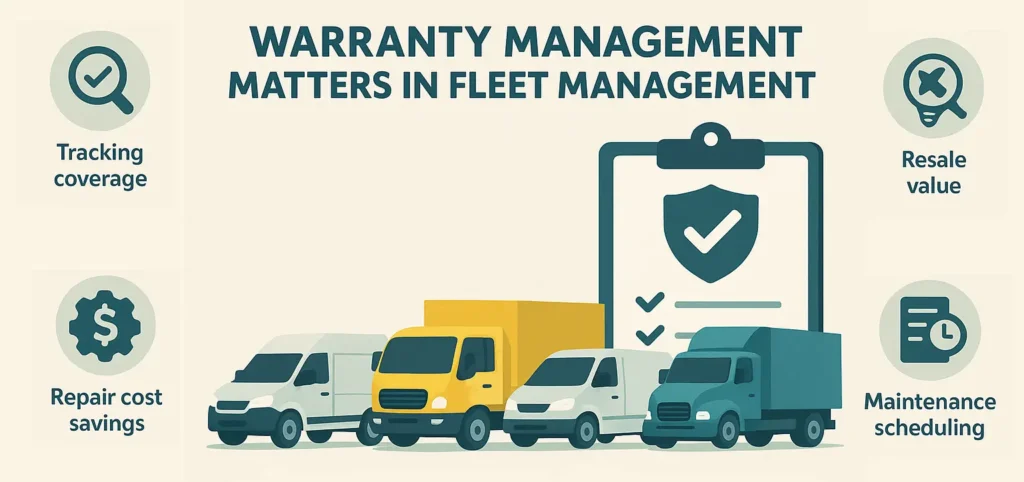Warranty management in fleet management refers to the process of tracking, validating, and managing warranty coverage for vehicles, parts, and maintenance services. It ensures that fleets maximize warranty claims, minimize repair costs, and avoid paying out-of-pocket for repairs covered under warranty terms.
Effective warranty management provides transparency and accountability between fleet operators, vehicle manufacturers, and service providers. Modern fleet management systems (FMS) automate warranty tracking by linking service history, parts inventory, and work orders — ensuring no warranty-eligible repair goes unclaimed.

Why Warranty Management Matters in Fleet Management
Warranty management is often overlooked, yet it has a major impact on operational efficiency and financial performance. Without a proper process, fleets risk paying for repairs that should be covered — directly reducing profit margins. Here’s why it’s essential:
Cost Savings and Budget Optimization
Fleet repairs can be expensive, especially when vehicles operate under demanding conditions. Warranties help offset these expenses by covering manufacturer defects and component failures. Properly managed warranties can save fleets thousands of dollars annually.
By systematically tracking warranty eligibility, managers can avoid double payments and ensure claims are submitted on time. For example, if a transmission fails within the manufacturer’s coverage period, a properly tracked warranty ensures that repair costs are reimbursed or fully covered.
Improved Maintenance Efficiency
Integrating warranty information into maintenance planning allows fleets to prioritize warranty-covered repairs at authorized service centers. This ensures compliance with manufacturer terms and prevents voiding warranties due to unauthorized repairs.
When service history and warranty data are connected, fleet managers can instantly verify which parts or components are still under warranty, reducing decision-making time and improving maintenance scheduling.
Compliance and Accountability
Many industries — particularly logistics, government, and construction — require transparency in maintenance expenditures. Warranty management provides an auditable record of claims, costs, and approvals. This not only simplifies internal reporting but also enhances compliance with regulatory and financial standards.
Data-Driven Replacement Decisions
Tracking warranty performance across multiple vehicles helps identify patterns in component failures. If a particular model consistently experiences issues within the warranty period, fleet managers can use that data to negotiate better terms or switch manufacturers.
Supplier and Vendor Management
Warranty tracking also helps evaluate vendor reliability. Fleet operators can compare how quickly and fairly suppliers process warranty claims, improving vendor accountability and optimizing partnerships.
Example in Practice
Imagine a national transport company with 200 vehicles, each covered by a 3-year manufacturer warranty and various part-specific warranties (tires, batteries, alternators, etc.).
Before implementing a warranty management system, the company often missed warranty claim deadlines and paid for covered repairs out of pocket.
After integrating warranty tracking into their fleet management software:
- The system automatically flags parts still under coverage.
- Repair orders are routed to authorized workshops.
- Warranty expiration reminders prevent missed claim windows.
- The system automatically flags parts still under coverage.
As a result:
- Annual repair expenses drop by 22%.
- The company successfully claims over $40,000 in previously missed reimbursements.
- Downtime decreases as claims are handled more efficiently.
- Annual repair expenses drop by 22%.
How Warranty Management Works in FuelTrack
Centralized Warranty Database
- All vehicle and part warranties are stored in one digital system.
- Includes start/end dates, claim terms, and service requirements.
Integration with Maintenance Records
- Links warranty information with service history to check eligibility automatically.
Claim Tracking and Reporting
- Manages open, approved, or denied claims.
- Tracks financial impact and response times from manufacturers.
Alerts and Automation
- Notifies fleet managers before warranties expire.
- Automates claim submissions when specific repair codes appear.
This level of automation ensures that warranty management becomes a proactive, cost-saving process rather than a manual administrative task.

Benefits Beyond Cost Reduction
- Enhanced Fleet Reliability: Vehicles repaired under warranty receive genuine parts and manufacturer-grade service.
- Vendor Accountability: Tracks supplier performance and response time.
- Improved Financial Forecasting: Warranty claim data improves budgeting accuracy.
- Sustainability Impact: Extending part and vehicle life through warranty utilization reduces waste and environmental footprint.